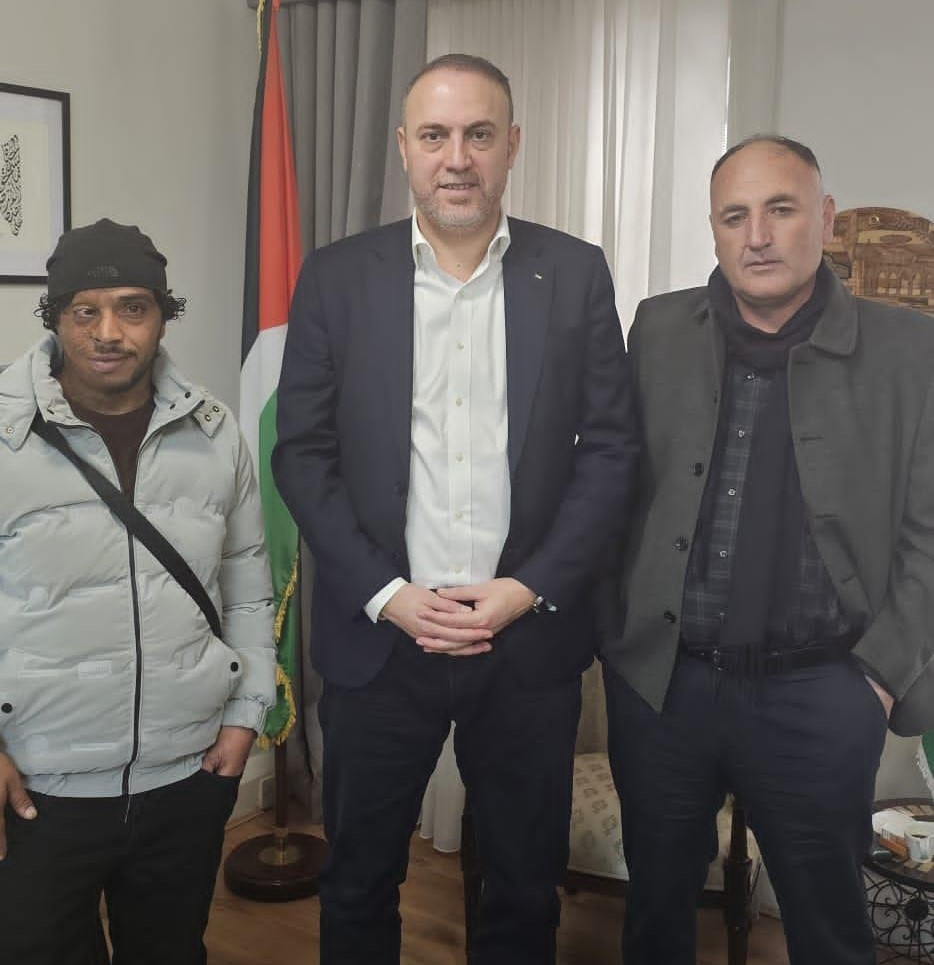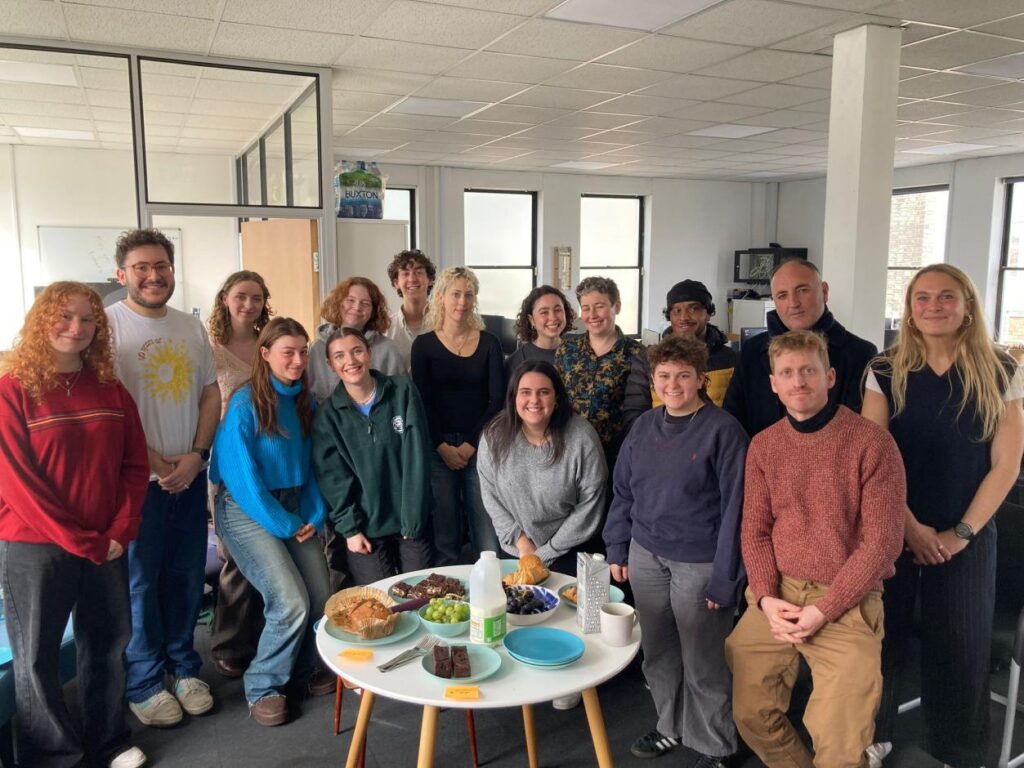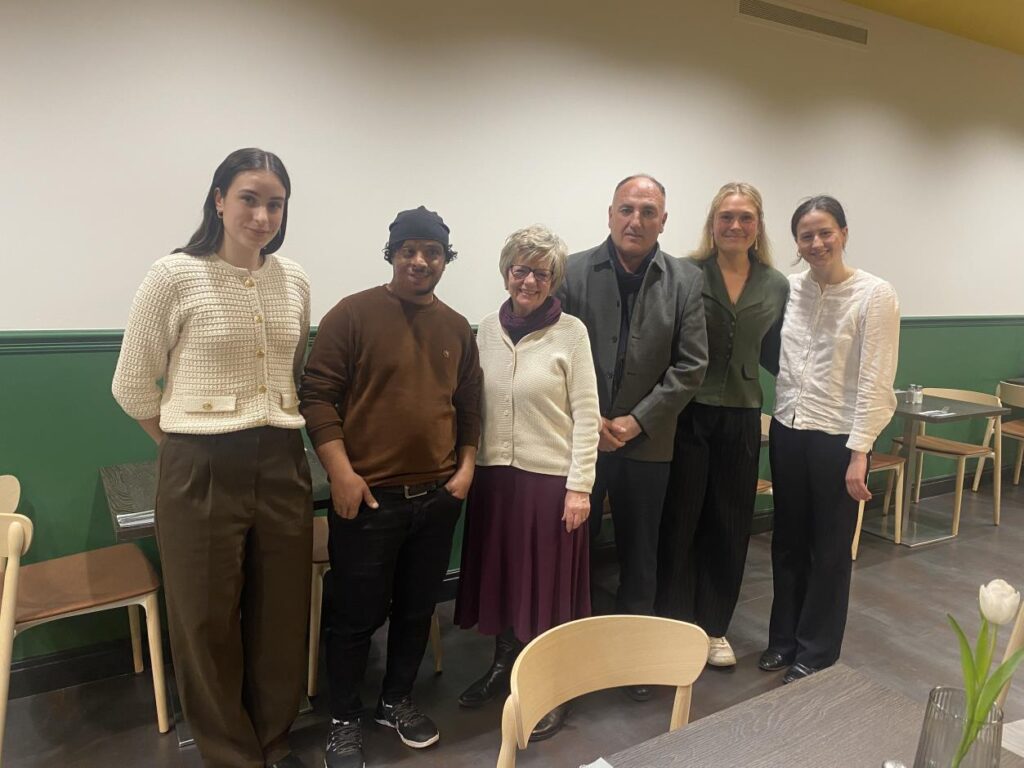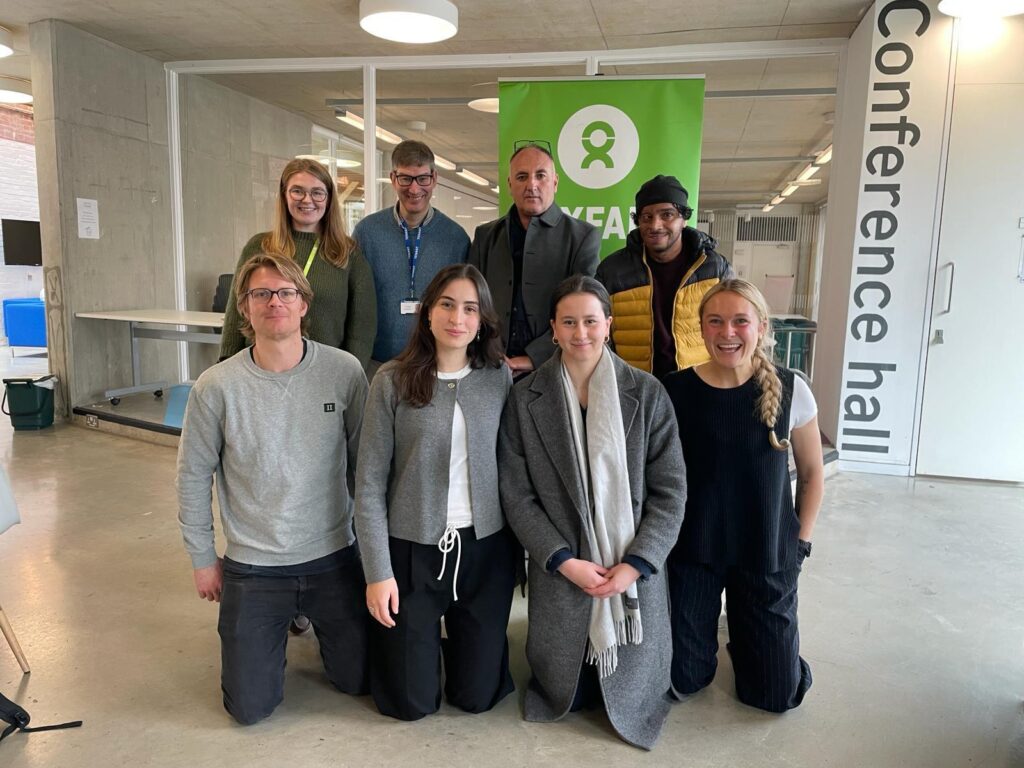Visit to UK by the Mayor of Masafer Yatt

25 February – 2 March 2024
Sponsored by the Balfour Project
By Lara Bird-Leakey
Setting the scene
In February, 2024, the Balfour Project had the honour of hosting two guests from the West Bank to deliver us in person the narrative of those living under Israeli occupation, and to put it at the forefront of conversation in the United Kingdom.
Nidal Younis is the mayor of Masafer Yatta, a collection of 19 hamlets in Area C, an area of the Occupied territories which has been under Israeli Military control since 1967. Born in Jinba, he has been continuously elected Mayor of the municipality since 2016. Owde Hathaleen is a teacher and journalist from Umm Al-Khair village, and a relentless activist and both have been at the forefront of the continued peaceful resistance of the region.
A teacher and a mayor should enjoy a life of relative security – and they would in most other contexts – but because of the settlers’ relentless persecution and determination to make life as hard as possible for Palestinians in Area C, Owde and Nidal have been forced to step into heroic roles.
The Balfour Project has been engaged in advocacy initiatives regarding the forced displacement and demolitions of Masafer Yatta since a group of Fellows from our Peace Advocacy Fellowship Programme curated an MP letter-writing campaign regarding the demolitions and Court Order in 2021. In 2022, the Israeli Supreme Court rejected an appeal from residents in Masafer Yatta against eviction orders issued to the inhabitants for the purpose of designating their region a training firing zone for the Israel Defence Force—or Israel Army. The Balfour Project decided that the most effective way to encourage change in UK policy and create public pressure to speak out against the demolitions was to hear first-hand what life under Israeli occupation entails.
One of the most humbling moments in the organisation of this tour was the realisation of just how difficult it would be to physically bring Nidal and Owde to Britain. The three day journey from Masafer Yatta to the Jordanian border, through various checkpoints, all with rigorous checks and veiled in uncertainty and anxiety, often manned by settlers rather than the IDF, is not an easy one by any stretch of the imagination.
From the outset of the tour, something that struck the team was the rational way in which Nidal and Owde spoke of life in Masafer Yatta, life which would shock even the most resilient of people: the day to day experiences of violence at the hands of settlers has intensified into calculated terror and attempts at ethnic cleansing. Fifteen times over a five-day period children are attacked, their sheep are slaughtered, their land confiscated, women are abused, homes are stormed and raided in the middle of the night by, at times, up to 50 masked settlers, and critical life resources such as water and solar panels are destroyed. Our guests’ integrity was deeply inspiring. I think that a shared takeaway from all parties that Nidal and Owde spoke to – politicians and NGOs alike – was the disbelief at just how consistent and unabated settler violence is, and awe at how the Palestinians still have hope. To which Nidal always replied that they have to hope, as to lose this is to give up on future generations.

The tour week
Monday 26 Feb:
We started the tour with a visit to Yachad in North London. Yachad is a British Jewish organisation whose mission is to support a political resolution to the Israeli Palestinian conflict. Yachad is tapped into an extensive network of students, community activists and young British Jews. It was this community that we wanted to engage, so a round table was organised with Nidal and Owde and members of different Jewish organisations based in London.
The structure of a lot of the events was the same throughout the week: Nidal and Owde would speak for 20 minutes or so, reliving the trauma that often accompanies their day to day life under occupation; explaining the relationship between the settlers and the IDF; detailing the reality of living under the constant threat of eviction and what it feels like to have your homes destroyed before your eyes, before they took questions from the audience. We tried to encourage a discussion, as Nidal and Owde felt that this was the best way to engage in the issues relevant to the particular audience that they were addressing.
At Yachad the conversation that flowed was fruitful and in depth. The students were keen to ascertain how they, as British Jews, could engage with the concept of occupation – something they admitted was often difficult to address within their community. The conversation centred on different perceptions of the situation in the West Bank and how these are being considered and addressed by the younger generations in the UK. The power of cross-religious community was noted, and the need to ensure that the narratives being circulated in different contexts were not simplifying the violence as one between Jews and Muslims, but are dangerous ones that seek to incite division and are political.
Our delegation then headed into Westminster, where Medical Aid for Palestinians (MAP) and the Council for the Advancement of Arab-British Understanding (CAABU) were hosting a parliamentary reception to hear from prominent speakers such as the Palestinian Ambassador in the UK, Husam Zomlot, and MAP CEO Melanie Ward. Nidal and Owde met some of the key actors that they would be engaging with during the week, and in what turned into a meaningful moment of solidarity and recognition, was the acknowledgment of their journey and the situation in Masafer Yatta by Ambassador Zomlot in his speech. The Balfour Project was given an honourable mention and while the topic of the day was the horrors unfolding in Gaza, it was very powerful to have the oppression of Palestinians in the West Bank highlighted by an individual regarded so highly within Westminster.
We then met the Scottish Nationalist Party Foreign Affairs Spokesperson, Brendan O’Hara MP, who has been to the West Bank with the Foreign Affairs Committee and was keen to be given an update on the situation on the ground. We finished off the day as a group, preparing for the rest of the week, sharing stories and solidarity over pizza.

Tuesday 27 February
Tuesday began with an address by Nidal and Owde to the Balfour Project Advisory Forum. Made up of individuals from a wide range of backgrounds with extraordinary experience in education and the advocacy of peace and justice in Palestine, our Advisory Forum guides much of the work that we do as an organisation. Without their connections and wisdom, much of the tour could not have taken place. It was an honour to connect them with Owde and Nidal and to provide them with the space to hear directly from individuals who are the motivation behind so much of the Balfour Project’s work.
Nidal, Owde and the fellows then travelled to Shoreditch, in East London, to an organisation which does some of the most important work in the field of human rights across the globe and tackles the most pressing injustices: Amnesty International. Here, we met Tom Guha, a campaigner at Amnesty with a history of writing and reporting on the occupation of Palestine, who had agreed to interview Nidal and Owde for the Amnesty International magazine. Tom came with a list of questions, and an allocated time slot of one hour, but the conversation quickly moved from a surface chat about the history of Masafer Yatta into a heartfelt detailing of what exactly life under occupation in Area C entails for the Palestinians living there.
Nearly three hours later, with more information than Tom perhaps bargained for, we wrapped up. Amnesty International has played a crucial role in exposing Israel’s oppression and discriminatory apartheid system of governing Palestinians. We hope that this interview will feed into its ongoing narrative and advocacy for justice regarding the systematic breaches of human rights and international law practised in the West Bank. The interview, coupled with photos shared by Nidal and Owde of the recent destruction of schools and homes at the hands of settlers in Masafer Yatta, will be available in the next edition of the Amnesty International UK magazine. We are extremely grateful to Tom for the time he gave to Nidal and Owde, and his ability to listen to, and digest, such harrowing realities with compassion and solidarity.
Wednesday 28 Feb
We started off Wednesday by meeting Ambassador Zomlot, who has become the voice of reason in the ever-fractious political narrative regarding the UK Government’s policy towards Palestine. Respected for his frankness and capability to remind politicians and the British public of the impact of their policies and narratives on the lives of Palestinians, he never exaggerates, just simply states the facts. This carries a lot of weight. Connecting over their leadership roles and persistence in protecting their own communities, Nidal and Husam spoke in Arabic as friends. We spent time with his diplomatic staff discussing the recent sanctions by the UK Government on four Israeli settlers – how this is too little too late and is seen as a PR stunt by the UK Government with very little impact for Palestinians. We discussed how the demand for further and wider sanctions is a genuine call for action which civil society can deliver to Parliament, as well as expressing disappointment and frustration at the politicisation by Parliament of Palestine since October 2023.
We next met Linda Ramsden, UK director of the Israeli Committee Against House Demolitions, for an interview which is now live on the ICAHD website. ICAHD believes that Israel’s true objective is to pursue its settler colonial programme, taking as much land of historic Palestine as possible and to move in more of the Jewish population even if it violates international law. Linda asked Nidal and Owde if there had been any repercussions on the community since the release of “No Other Land” – a film by Basel Adra and Yuval Abraham which demonstrates that Palestinians and Israelis have endless points of connection, and can live in peace, despite the narrative being spun by the Israeli Government.
Nidal detailed the fear that activists feel in Area C and Masafer Yatta, and Owde spoke of the reality of settlers confiscating cameras, laptops and the phones of villagers in order to curb the ability of Palestinians to share with the world the settlers’ violence, which increasingly consists of kidnapping, arbitrary detention and torture.
Nidal and Owde then addressed parliamentarians engaged in the Britain Palestine APPG which was chaired by Flick Drummond MP. The fellows and I had, by now, become somewhat accustomed to hearing the brutal reality of life in Masafer Yatta, and I think we had forged the ability to compartmentalise the stories that we were hearing. What surprised us all at this meeting was the level of emotion expressed by the members present. With some being moved to tears and others taking copious notes of everything Nidal said, this APPG brought two parallel realisations: that those in Westminster who care, care a lot, but that there is a lot more to be done to rally others. Genuinely desperate to hear what can be done by Parliament to help in Masafer Yatta, one member asked if Nidal and Owde still have hope. Not for the first time during the week, Owde answered that they have to, because if they lose hope, what else have they got?

Thursday 29 Feb
For our penultimate day of the tour, we had back-to-back meetings with Oxfam, Care International and with Lord Ahmad at the FCDO, as well as an interview with Mark Seddon at Palestinian Deep Dive.
We were hosted by Oxfam’s Senior Policy Advisor and the UK Government Relations Adviser, who have done a lot of work on the West Bank. They wanted to hear exactly what role monitoring bodies can play in recording and deterring settler violence. Nidal explained that Oxfam used to have a large presence in the region but are no longer present in Masafer Yatta – ultimately because of reduced funds. They wanted to know explicit detail of the settler tactics, and Owde described how 45 soldiers had recently raided his mother’s house in the middle of the night; that because of arbitrary settler checkpoints and road closures it recently took a pregnant woman six hours to get to hospital. Nidal told Oxfam that the feeling of isolation in Masafer Yatta is overwhelming. The Palestinians need more than solidarity, he said – they need international presence, ways to protect young families, and more than just sanctions on four settlers. Nidal and Owde asked Oxfam to write more about Masafer Yatta, to raise awareness of the reality that this is not a conflict or a war – it is a systematic oppression. The Palestinians have their cameras and some voices on the outside, but this is no longer enough.
Heather Lafferty, Richard Stanforth and Magnus Corfixen were incredibly generous with their time, and ensured that Nidal and Owde had the contact information of their Palestinian colleagues, and – not for the first time during the week – we were reminded how many hardworking people and organisations there are working tirelessly for peace and justice for Palestinians.
Another such organisation, and individual, is Suzy Madigan from Care International. Care International UK is part of the UK’s Bond Advocacy Working Group on Israel and the Occupied Palestinian Territories along with several international NGOs. They regularly meet FCDO representatives to discuss humanitarian issues in Gaza and across the West Bank. On the day we met, the Working Group meeting was focused on issues related to the West Bank. I am in awe of Nidal and Owde and their ability to talk to strangers about the reality of their lives under Israeli occupation in such a matter of fact manner.
When the reality is such intense and concentrated oppression, they make themselves so vulnerable by asking for help over and over again – what must that feel like? Care were interested specifically in how the occupation is impacting women and children, so Owde told Suzy of his own son, and how, after their house had been raided by 50 masked settlers in the middle of the night, and how they were woken up by barking and biting dogs, his four year old developed a stutter so bad that that the doctor said it would go once he felt safe. But how can he feel safe in this life?
After an emotional hour with Suzy, we had an online interview with Mark Seddon for his podcast on Palestinian Deep Dive. A former UN Secretary-General speechwriter and media adviser, well versed in the political and historical obstacles to safety or solutions in Palestine, Mark wanted to ascertain whether there had been any changes in the region since the 2022 Israeli Supreme Court ruling which allowed the designation of Masafer Yatta a firing zone for IDF training – essentially providing a legal justification for forced evictions and demolitions of Palestinian homes.
Nidal described the discriminatory regime which dictates that Israelis live under civil law and Palestinians under a restrictive and oppressive military law. Palestinian villages are being ripped down to, supposedly, make space for the firing range, while in fact Israeli settlements are then being built in their place. Mark asked about the relationship between the IDF and settlers. Nidal explained that the settlers have formed an unofficial militia in their own right – have weapons supplied by the Israeli authorities, and being afforded protection from the crimes they commit, but acting very much with their own autonomy and mandate in Area C. Owde added that this has got exponentially worse since 7 Oct – with kidnappings and torture becoming commonplace. To hear the interview in full, you can listen here.
Our last port of call on Thursday was to the FCDO to meet Lord Ahmad, the Minister of State for the MENA region. This meeting was requested by Sir Vincent Fean, a trustee and former chair of the Balfour Project. We were given half an hour. It was a constructive meeting, though there was definitely a stark difference between it and the meetings with NGOs and community members throughout the week, who desperately wanted to know how they could help and what they could do.
Lord Ahmad was well-informed and had visited Masafer Yatta in January, 2023. He expressed genuine concern, but without committing to new action beyond ensuring contact between Mayor Nidal and the British Consulate-General in Jerusalem. At the end of the meeting Sir Vincent raised the need to relax Home Office restrictions on helping Palestinians with UK connections (eg a five- year UK visa) to reach Egypt. The Minister “took note”. The British Government has much to answer for. But as Owde so resolutely reminded us throughout the week, no one was talking about Masafer Yatta 10 years ago, so public pressure is moving in the right direction; we just have to hope it’s enough, and in time.
Our final event of the day – number five for those counting – was one of the best get togethers of the week. Gathered in a small pub function room by St James’s Park, 25 supporters, allies, and friends of Nidal and Owdes shared a meal together, to remind ourselves that in the midst of human cruelty and injustice there is community and commitment to finding peace and justice.We have to understand that what is happening in Masafer Yatta is not isolated to this region, but that if we allow this treatment by one human towards another it sets a precedent as to how humanity will act in future. This is not a fight just for the people in Palestine, but for the sanity and morality of the wider international community.

Friday 1 March
Born out of connections made while they were both students at Durham University, the two fellows working on the tour, Jasmine Moore and Kira Nygren, planned the day in Durham. Starting off with a meeting at the North Road Methodist Church, Nidal and Owde addressed members of the Durham Palestine Solidarity Campaign, councillors, students and clergy members. A relaxed and safe environment, full of people who understood the occupation and with many who have been involved in activism in their own lives, we had over two hours to dive into life in Masafer Yatta. Thoughtful questions were posed to Nidal and Owde and perhaps one of the most unexpected successes from the tour is the twinning initiative now being established between Durham and Masafer Yatta – a commitment to long-term solidarity, support, and friendship.
For our final event, Nidal and Owde, Balfour Project trustee and historian Peter Shambrook, and I were invited, alongside Jasmine and Kira, to speak on a panel to the Durham University Foreign Affairs Society. The panel was recorded by PalTV and turned into a podcast for the university media platform. Each of us offered a different perspective to the occupation of Palestine and the situation in Area C. Nidal and Owde spoke of the facts on the ground, Peter of the historical role and responsibility of the UK Government, and I spoke of the legal framework relating to the occupation.
We then had questions from the audience. Admittedly, after a week of engagement with NGOs and experienced civil society whose aim was to listen to Nidal and Owde and use their narratives to advocate for justice, humanitarian assistance, or the furtherance of human rights in Occupied Palestine, I don’t think we were prepared for the over-academic and theoretical questions from students. The tone was very different from previous events, and there was a very familiar – to all of us who have previously been in academic environments – sense of need to ask technical questions, which the students did. Taking the new context in their stride, and appreciative of the fundamental need for platforms to have debate, share opinions and respectfully delve into tricky concepts, this was more of a mental exercise for the panellists than previous events, but still an incredibly fruitful one.
Honoured to have been hosted by Durham University and met by a fully packed room on a Friday evening, the opportunity to engage with potentially new allies and those who will undoubtedly be in positions of responsibility and power in years to come was grasped by Nidal and Owde. The students all had a real interest in talking more with them and the rest of our team, and it was past 10pm by the time we had to leave.
Exhausted, emotionally, and physically, and in denial about the fact that tomorrow Nidal and Owde would be leaving us, we all went straight back to our hotels and collapsed.
Conclusion
There are so many positives to take away from the week, and what has been absolutely crucial for our team is to hold onto these positives. If we didn’t, I think the feelings of helplessness would be overwhelming – and, as I’ve tried to articulate through this write up, there are so many incredible organisations and individuals working so hard to ensure that we do have hope.
One of the most heartening moments of the week for me, and something that I certainly will be holding onto, is the realisation from Nidal and Owde of how many people in the UK are talking about Palestine. We were on our way to Amnesty and came across a “Free Palestine” mural painted on a wall in Shoreditch, which nearly reduced Owde to tears. Second to that, at the MAP event in Parliament Owde couldn’t believe that there was a whole event dedicated to talking about Palestine, and when I told him about the debates, protests and overwhelming public solidarity here, he couldn’t believe it. It might be slow moving to instigate political or legal action, but the public are mobilised and outraged at the treatment of Palestinians. There is fury, not just at the civilians being bombarded and killed in Gaza, but at the ethnic cleansing and forced displacement, at what Owde described as the “slow genocide”, of Palestinians in the West Bank.
This tour was an opportunity to bring the narratives and lived experiences of Palestinians in Masafer Yatta to the forefront of conversation in the United Kingdom. To ensure that policy makers remember that their actions have very real consequences on other human beings, and to bolster the already strong and dedicated network of support in the UK. Owde and Nidal are back in Masafer Yatta now, but we speak to them daily. The Balfour Project is committed to being a voice in the UK for their plight – and for their rights – for as long as it takes.
Lara Bird-Leakey is currently working in Parliament as the Senior Foreign Affairs and Defence Researcher for the SNP, whilst conducting her PhD at Kings College London War Studies Department on the subject of UK Government policy and IHL in the context of non-international armed conflict. She holds an LL.M in Public International Law from the LSE and is a member of the Honourable Society of Middle Temple, having been awarded the Queen Mother Scholarship for her Bar studies at the ICCA. She was a Balfour Project Fellow in 2021 and now sits on the Executive Committee as well as assisting with ongoing Fellowship projects.
